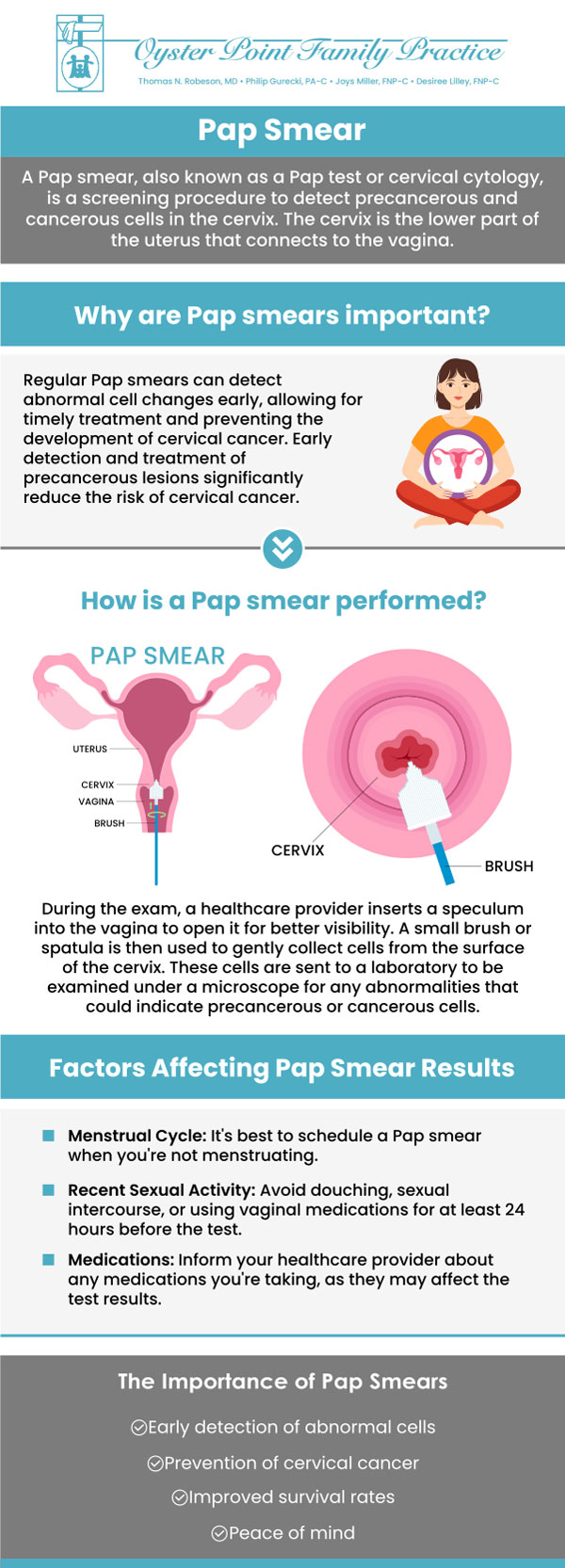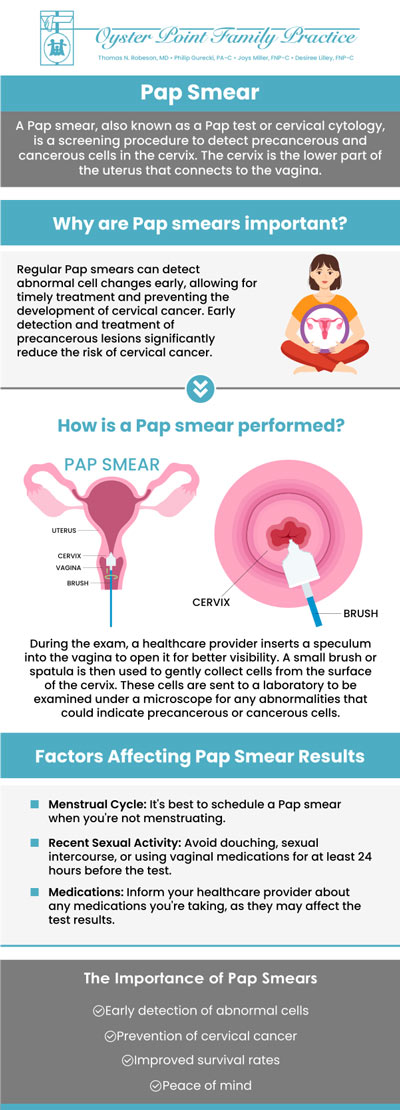Pap Smear Doctor in Newport News, VA
Pap smear is a routine screening test that is designed to detect abnormal cell changes on the cervix that could lead to cancer, often caused by the human papillomavirus (HPV). Dr. Thomas N. Robeson, MD, at Oyster Point Family Practice, performs the test to get an early look at your cervical health. If abnormal cells are found, our dedicated team recommend follow-up tests and a treatment plan. For more information, please contact us or schedule an appointment online. We are conveniently located at 704 Thimble Shoals Blvd Suite 700, Newport News, VA 23606.


Table of Contents:
What is a Pap smear, and why is it important?
How often should a woman get a Pap smear?
What can a Pap smear detect?
Is a Pap smear painful?
At Oyster Point Family Practice, we prioritize your health and well-being by offering essential preventive screenings like the Pap smear (also known as the Pap test). This important procedure is designed to screen for cervical cancer in women by detecting early changes in cervical cells before they become cancerous.
During your visit, our caring healthcare providers will gently collect a small sample of cells. These cells are then carefully examined for any abnormalities that might indicate precancerous or cancerous conditions. Early detection through regular Pap smears is crucial, as it allows us to recommend further testing or treatment and, most importantly, helps prevent the development of cervical cancer.
With routine Pap testing, the incidence and mortality rates of cervical cancer have significantly decreased. In addition to screening for cancerous changes, this test can also help identify certain infections and inflammation.
We follow the latest medical guidelines, recommending that women begin Pap smear screening at age 21, with repeat testing at intervals determined by your age, health history, and risk factors. Our team will work with you to create a personalized screening schedule that fits your needs.
A Pap smear is a vital test that detects cervical cancer and identifies changes in cervical cells that could potentially lead to cancer.
Our providers follow the latest guidelines to ensure our patients receive the best preventive care:
• For most women, Pap smear screening should begin at age 21.
• Women ages 21–29 should have a Pap smear every three years, as long as results remain normal.
• Women ages 30–65 may continue with Pap smears every three years or choose a combined Pap smear and human papillomavirus (HPV) test every five years if both test results are normal.
• After age 65, many women with a history of regular, normal screenings may no longer need Pap smears, though this decision should be made in consultation with your provider.
Some women—such as those with a history of abnormal Pap results, a weakened immune system, or previous cervical cancer—may require more frequent screening. At Oyster Point Family Practice, we encourage all women to discuss their individual risk factors and the most appropriate screening schedule with our caring healthcare team.
Pap test is a simple, routine procedure that is essential for detecting abnormal changes in the cells of the cervix.
The primary goal of a Pap smear at Oyster Point Family Practice is to screen for cervical cancer by identifying precancerous or cancerous cells at an early stage, when treatment is most effective. In addition, this test can reveal the presence of human papillomavirus (HPV), a major risk factor for cervical cancer. Occasionally, a Pap smear may also indicate other infections or inflammation, such as those caused by yeast, bacteria, or trichomoniasis, although it is not specifically designed for diagnosing these conditions.
Early detection is key to maintaining your health and well-being. If you have questions about Pap smears or need to schedule your screening, please contact our clinic, we are here to support you every step of the way.
At Oyster Point Family Practice, we are committed to providing comprehensive and compassionate preventive care for all our patients. One of the most important preventive screenings we offer is the Pap smear (also known as a Pap test). This routine procedure helps detect abnormal cells in the cervix that could lead to cervical cancer, allowing for early intervention and peace of mind.
Many patients ask us if a Pap smear is painful. For most individuals, the test is not considered painful, though it can be a bit uncomfortable. During your Pap smear, one of our experienced healthcare providers will gently insert a speculum into the vagina to allow access to the cervix. You may feel a sensation of pressure or mild discomfort during this step, but it should not cause sharp pain.
Once the cervix is visible, your provider will use a small brush or spatula to collect cells from the cervical surface. This process might feel a little scratchy or unusual, but it only takes a few seconds. Some patients experience minor cramping or light spotting afterward, which is normal and usually goes away quickly. If you experience significant pain at any time during your exam, please let us know immediately so we can make adjustments to keep you comfortable.
Feeling anxious about a Pap smear is common. Our team at Oyster Point Family Practice is here to support you every step of the way. We encourage you to talk to us about any concerns or questions you may have before your appointment. Relaxing your muscles and taking slow, deep breaths can also help make the procedure easier.
Remember, Pap smears are a vital part of preventive health care for anyone with a cervix. For more information, please contact us or schedule an appointment online. We are conveniently located at 704 Thimble Shoals Blvd Suite 700, Newport News, VA 23606. We serve patients from Newport News VA, Grafton VA, Hampton VA, Poquoson VA, Seaford VA, Carrollton VA, and surrounding areas.
Check Out Our 5 Star Reviews


Additional Services You May Need
• Annual Physicals
• Sick Visits
• Chronic Care Management
• Well Child Visits
• Women’s Health
• Blood Glucose Monitoring
• Bone Densitometer Testing (Dexa Scan)
• Pulse Oximetry Testing
• Pulmonary Function Testing
• Gynecology
• Newborn Care
• Acute Conditions
• Flu Shots
• School Physicals
• Minor Surgeries
• Chronic Conditions
• Physicals
• Covid-19 Vaccine Information
• Pre Operation Clearance Physicals
• Auto Accident Injury
• Cuts and Bruises
• Sprains & Strains
• Same Day Sick Visits
• Immunizations – Tdap
• MMR
• IPV
• Diabetes Management
• Pneumonia
• Shingrix
• Childrens Vaccines
• Walk-in Lab Services
• Women’s Physicals
• Men’s Physicals
• Sports Physicals
• PAP Smears
• COPD
• Geriatric Care
• Travel Medicine Clinic
• Osteoporosis
• Immunizations

Additional Services You May Need
• Annual Physicals
• Sick Visits
• Chronic Care Management
• Well Child Visits
• Women’s Health
• Blood Glucose Monitoring
• Bone Densitometer Testing (Dexa Scan)
• Pulse Oximetry Testing
• Pulmonary Function Testing
• Gynecology
• Newborn Care
• Acute Conditions
• Flu Shots
• School Physicals
• Minor Surgeries
• Chronic Conditions
• Physicals
• Cuts and Bruises
• Sprains & Strains
• Same Day Sick Visits
• Immunizations – Tdap
• MMR
• IPV
• Diabetes Management
• Pneumonia
• Shingrix
• Childrens Vaccines
• Walk-in Lab Services
• Women’s Physicals
• Men’s Physicals
• Sports Physicals
• PAP Smears
• COPD
• Geriatric Care
• Travel Medicine Clinic
• Osteoporosis
• Immunizations
• Covid-19 Vaccine Information
• Pre Operation Clearance Physicals
• Auto Accident Injury


